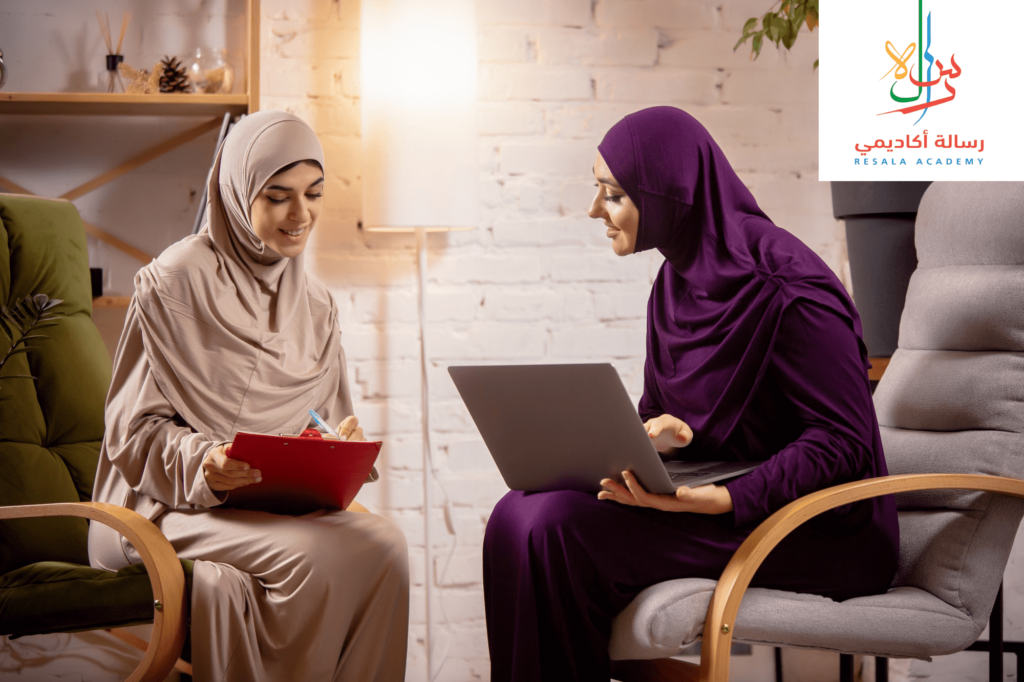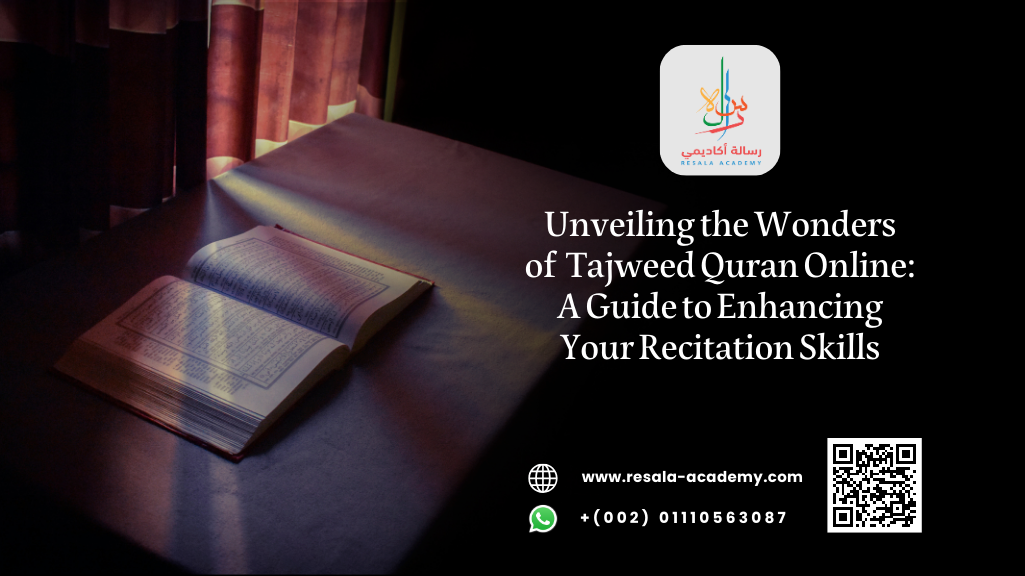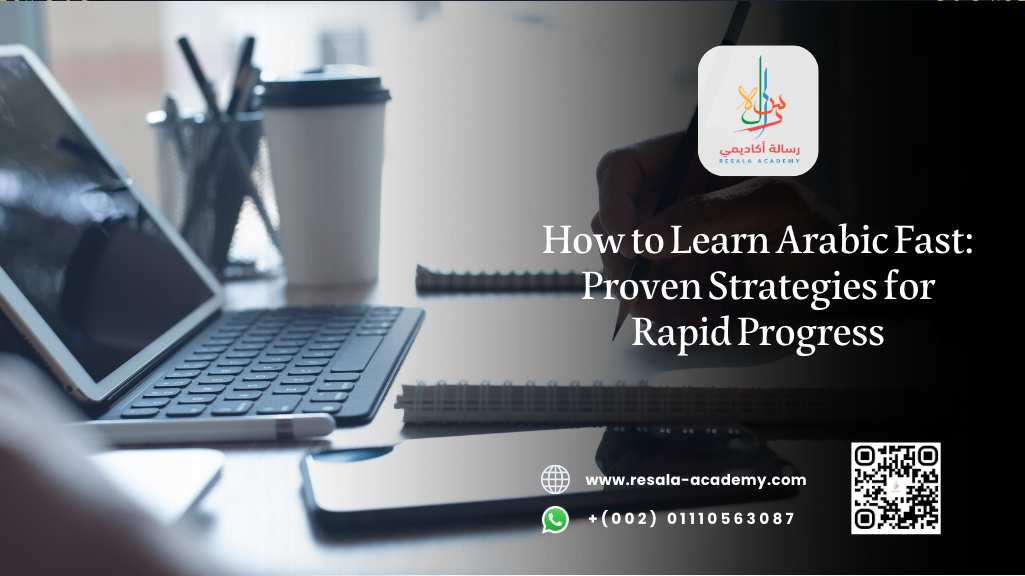Table of Contents
The Impact of Balagha (Rhetoric) in Quranic Arabic Course: Unlocking the Quran’s Eloquence
The Quran is not only a divine book of guidance but also a linguistic miracle that has captivated scholars, poets, and believers for centuries.
Central to its linguistic excellence is Balagha (rhetoric), which refers to the art of eloquence and effective communication.
For students enrolled in a Quranic Arabic course, understanding the Balagha is key to appreciating the Quran’s depth, beauty, and meaning.
This article delves into the importance of Balagha in Quranic Arabic, its key elements, and how Online academies like Resala Academy empower students to explore this fascinating field.
What is Balagha in Quranic Arabic?
Balagha (بلاغة) in Quranic Arabic is the art of delivering profound meanings with precision, clarity, and beauty.
It encompasses the use of rhetorical devices, word choice, and stylistic features that make the Quran unique and inimitable.
The Quran’s Balagha is so extraordinary that it challenged the eloquent Arabs of its time to produce even a single chapter like it:
قُل لَّئِنِ ٱجْتَمَعَتِ ٱلْإِنسُ وَٱلْجِنُّ عَلَىٰٓ أَن يَأْتُوا۟ بِمِثْلِ هَـٰذَا ٱلْقُرْءَانِ لَا يَأْتُونَ بِمِثْلِهِۦ وَلَوْ كَانَ بَعْضُهُمْ لِبَعْضٍۢ ظَهِيرًۭا
“Say, ‘If mankind and the jinn gathered to produce the like of this Quran, they could not produce the like of it, even if they were to each other assistants.'”
This verse underscores the Quran’s unmatched eloquence, which remains a linguistic miracle to this day.
The Role of Balagha in Quranic Arabic Courses
A Quran Intermediate Course Online that incorporates Balagha equips students with the tools to uncover the Quran’s linguistic miracles. Here’s how Balagha enhances Quranic studies:
1. Deepening Tafsir (Exegesis)
Balagha is essential for understanding the Quran’s deeper meanings. For example, the Quran uses specific words and structures to convey layered meanings. In Surah Al-Kawthar, Allah says:
إِنَّآ أَعْطَيْنَـٰكَ ٱلْكَوْثَرَ
“Indeed, We have granted you Al-Kawthar.”
The word “Al-Kawthar” (الكوثر) is an example of Balagha, as it signifies abundance, encompassing spiritual blessings, the river in Paradise, and the Prophet’s (peace be upon him) legacy.
2. Appreciating the Quran’s Eloquence
Balagha helps students appreciate the Quran’s stylistic beauty, such as its rhythm, word choice, and rhetorical devices.
For instance, the repetition of “فَبِأَيِّ آلَاءِ رَبِّكُمَا تُكَذِّبَانِ” (So which of the favors of your Lord would you deny?) in (Surah Ar-Rahman, 55:13) emphasizes gratitude and reflection.
3. Strengthening Faith
The Quran’s Balagha appeals to both intellect and emotions, strengthening faith. For example:
وَلَقَدْ يَسَّرْنَا ٱلْقُرْءَانَ لِلذِّكْرِ فَهَلْ مِن مُّدَّكِرٍۢ
“And We have certainly made the Quran easy for remembrance, so is there any who will remember?”
The rhetorical question invites reflection, while the repetition reassures believers of the Quran’s accessibility.
4. Connecting with the Quran’s Message
For non-native speakers, learning Quranic Arabic with a focus on Makharij and Balagha bridges the gap between translation and the original text, allowing them to experience the Quran as it was revealed.
Key Elements of Balagha in the Quran
The Quran’s Balagha is characterized by various rhetorical and stylistic features that make its message profound and impactful. Below are expanded key elements of Balagha in the Quran:
1. Ijaz (Conciseness)
The Quran conveys profound meanings in a few words. For example:
وَوَجَدَكَ ضَآلًّۭا فَهَدَىٰ
“And He found you lost and guided [you].”
This verse succinctly describes the Prophet Muhammad’s (peace be upon him) journey from uncertainty to divine guidance. The conciseness of the Quran is a hallmark of its Balagha.
2. Tashbih (Similes)
Similes in the Quran clarify abstract concepts by comparing them to tangible examples. For instance:
مَّثَلُ ٱلَّذِينَ يُنفِقُونَ أَمْوَٰلَهُمْ فِى سَبِيلِ ٱللَّهِ كَمَثَلِ حَبَّةٍ أَنۢبَتَتْ سَبْعَ سَنَابِلَ فِى كُلِّ سُنۢبُلَةٍۢ مِّا۟ئَةُ حَبَّةٍۢ ۗ وَٱللَّهُ يُضَـٰعِفُ لِمَن يَشَآءُ ۗ وَٱللَّهُ وَٰسِعٌ عَلِيمٌ
“The example of those who spend their wealth in the way of Allah is like a seed [of grain] that grows seven ears; in every ear is a hundred grains.”
This simile illustrates the immense rewards of charity, making the concept relatable and vivid.
3. Isti’ara (Metaphors)
Metaphors in the Quran convey deeper meanings. For example:
ٱللَّهُ نُورُ ٱلسَّمَـٰوَٰتِ وَٱلْأَرْضِ ۚ
“Allah is the Light of the heavens and the earth.”
Here, light symbolizes guidance, knowledge, and divine presence, encapsulating Allah’s role as the ultimate source of illumination.
4. Repetition for Emphasis
Repetition in the Quran reinforces key messages and evokes emotions. For example:
إِنَّ مَعَ ٱلْعُسْرِ يُسْرًۭا * فَإِنَّ مَعَ ٱلْعُسْرِ يُسْرًا
“Indeed, with hardship [will be] ease. Indeed, with hardship [will be] ease.”
The repetition reassures believers that ease always follows hardship, instilling hope and perseverance.
5. Kinaayah (Allusion)
Kinaayah refers to indirect expressions that imply deeper meanings. For example:
وَٱخْفِضْ لَهُمَا جَنَاحَ ٱلذُّلِّ مِنَ ٱلرَّحْمَةِ
“And lower to them the wing of humility out of mercy.”
The phrase “lower the wing of humility” is an allusion to showing kindness and respect to one’s parents.
6. Antithesis (Tibaq)
The Quran often contrasts opposites to highlight its message. For example:
وَهَدَيْنَـٰهُ ٱلنَّجْدَيْنِ
“And We have shown him the two ways.”
This verse contrasts the path of righteousness with the path of wrongdoing, emphasizing the importance of choice.
7. Parallelism
The Quran uses parallel structures to create rhythm and symmetry. For example:
إِنَّ ٱلْأَبْرَارَ لَفِى نَعِيمٍۢ * وَإِنَّ ٱلْفُجَّارَ لَفِى جَحِيمٍۢ
“Indeed, the righteous will be in pleasure, and indeed, the wicked will be in Hellfire.”
The parallelism underscores the contrast between the rewards of the righteous and the punishment of the wicked.
How Resala Academy Incorporates Balagha in Quranic Arabic Courses
At Resala Academy, students are guided through the Quran’s linguistic beauty with a focus on Balagha. Here’s how:
- Specialized Curriculum: The academy’s Quranic Arabic course includes modules on Balagha, covering rhetorical devices, word choice, and stylistic features.
- Interactive Learning: Students analyze Quranic verses to uncover their rhetorical brilliance.
- Qualified Instructors: Resala Academy’s teachers are experts in Quranic Arabic and Balagha, ensuring students receive high-quality instruction.
- Tailored for Non-Native Speakers: The course is designed to make Balagha accessible to learners from diverse linguistic backgrounds.
- Flexible Online Classes: Students can learn at their own pace, making it convenient for busy schedules.
Discover the unmatched eloquence of the Quran with Resala Academy!
Whether you’re a beginner or an advanced learner, our Quranic Arabic course is designed to help you connect with the Quran on a deeper level.
Learn from expert instructors, explore the beauty of Balagha, and experience the Quran as it was revealed.
Start your journey today! Enroll in Resala Academy’s Quranic Arabic course and unlock the linguistic miracle of the Quran.
Click here to register now!
FAQs
1. What is Balagha, and why is it important in Quranic Arabic?
Balagha refers to the art of eloquence and effective communication. In Quranic Arabic, it highlights the Quran’s linguistic miracle, helping students understand its profound meanings and appreciate its unmatched eloquence.
2. Can non-native speakers learn Balagha in a Quranic Arabic course?
Yes! Online academies like Resala Academy offer Quranic Arabic courses tailored for non-native speakers, making Balagha accessible and easy to learn.
3. How does Balagha enhance Quranic understanding?
Balagha reveals the Quran’s deeper meanings by analyzing its rhetorical devices, such as metaphors, similes, and conciseness. This enhances both intellectual and spiritual comprehension.
4. What are some examples of Balagha in the Quran?
Examples include the metaphor in Surah An-Nur (24:35), where Allah is described as the “Light of the heavens and the earth,” and the repetition in Surah Ar-Rahman, emphasizing Allah’s blessings.
5. How can I enroll in a Quranic Arabic course at Resala Academy?
You can visit Resala Academy’s website and register for their Quranic Arabic course. The academy offers flexible online classes, expert instructors, and a focus on Balagha to help you unlock the Quran’s eloquence.
Conclusion
The Quran’s Balagha (rhetoric) is a cornerstone of its linguistic miracle, conveying profound meanings with unmatched eloquence.
By studying Balagha in a Quranic Arabic course, students uncover the Quran’s beauty, deepen their understanding, and connect with its divine message on a spiritual and intellectual level.
Online academies like Resala Academy make this journey accessible, offering expert-led courses tailored to help learners explore the Quran’s eloquence. Begin your transformative journey today with Resala Academy and unlock the timeless beauty of the Quran.




